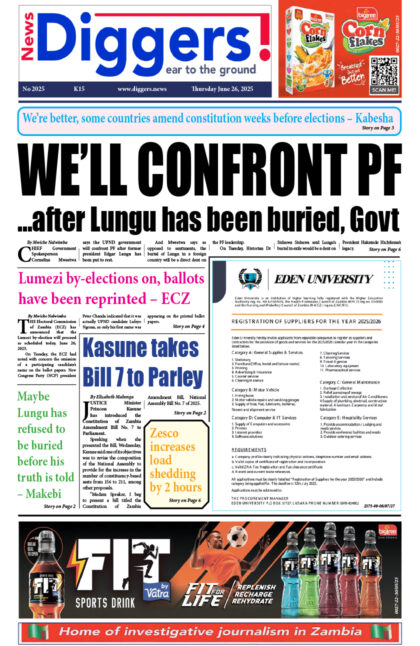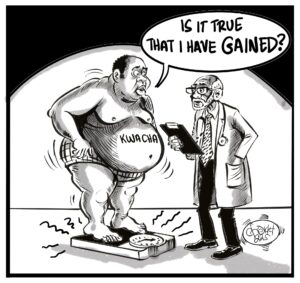FINANCE Minister Dr Situmbeko Musokotwane says the current conflict between Russia and Ukraine might cause an upward adjustment in fuel prices.
And Presidential Spokesperson Anthony Bwalya says President Hakainde Hichilema is currently monitoring possible ripple effects the tensions in Ukraine could have on key global commodity prices.
In an interview, Monday, Dr Musokotwane said although the conflict could result in an upward adjustment of fuel prices and other items, an instant increase in inflation was not expected.
“The risk is there because some of the commodities that come out of Russia are traded. Because of the war, I think now the prices are surging upwards. I am sure you have been reading through the international media, the price of oil has been going up, the price of gas is also going to go up, if it is not already going up, because most of the supplies were coming out of Russia. So that will have an impact on us,” he said.
“So that being the case, when the price of fuel went up, yes fuel prices went up, but it didn’t mean that the price of everything else must automatically follow through, no it did not. That is why you see that even though the price of fuel went up, the inflation rate still came down. What I am saying now is, yes there is a war that is raging, the price of fuel and other items might go up just waiting to see, but that cannot mean that we should automatically expect inflation to go up. It could, depending on circumstances but it is not automatically the case.”
And Dr Musokotwane said the country was expected to record a single digit inflation rate by the end of the year.
“The intention of the UPND government [is] to drop inflation levels to single digit by the end of this year. When we took over office, inflation was at I think just over 23 percent, and we stated [during the] budget address that our target was up to single digit by the end of the year. Before that, every month it was going up, but from the time we took over office every month without exception it is coming down. So I am very confident that by the end of the year we should be having inflation below 10 percent as we had desired. We are on the correct path,” said Dr Musokotwane.
“Let me also say this with respect to inflation, inflation of course measures the pace or the rate, or the speed by which prices are changing. Inflation is not about where the prices are, it is about how the prices are changing, so it is the change in prices. To measure inflation, the statisticians like those at the Zambia Statistical Agencies, don’t just look at one commodity. I remember the time the price of fuel was increased, when we removed the subsidies, people were saying now inflation is going to go out of the roof, we said no! Not necessarily because we measure inflation not by looking at just one item, you measure inflation by looking at a typical basket of goods that the ordinary consumer purchases. So in measuring inflation, we have items like food items, which actually is the biggest weight or biggest consideration that measures [inflation]. Fuel of course is part of that basket, services like hair cuts, laundry so many items. Within food itself there are so many items that are measured. Prices are measured separately, the main one, of course, is mealie meal then relish like Kapenta, cabbage, fish, items like cooking oil, sugar. So all these items, it is a very long list of the basket which is together considered to check how prices are going.”
And in a statement, Monday, Bwalya said President Hichilema and the entire UPND administration were observing with keen interest the possible ripple effects the tensions in Ukraine could have on key global commodity prices.
“The President and the whole administration are observing with keen interest the possible ripple effects the tensions in Ukraine could have on key global commodity prices such as oil and fertilizer because both play such a significant role in the positioning of the Zambian economy. It is important to note, that our ability to import cheap oil into the country remains utterly critical in ensuring that general economic costs associated with the use of various forms of fuel are kept at an affordable minimum for our citizens,” he said.
“It must further be noted that a disruption to the global fertilizer supply chain has the potential to adversely affect agriculture production for the 2022/23 farming season if suppliers do not have sufficient buffer stocks to meet the demands of the forthcoming farming season.”
Bwalya said President Hichilema had put on high alert all line Ministries and Ministers to ensure that strategies were put in place to anticipate and respond to the challenges.
“The President has, therefore, put on high alert all line ministries and ministers to ensure that strategies are in place to rapidly anticipate and appropriately respond to these challenges, should they arise, and mitigate them accordingly. The administration will continue to take active steps aimed at lowering the cost of living as already seen by the over 55 percent positive performance of the Kwacha against the Dollar over the past six months, with inflation down from 24 percent to 14 percent over the same period; while basic salaries are up by 12 percent and another 13 percent improvement in the tax exempt amount for lower income earners,” said Bwalya.



















